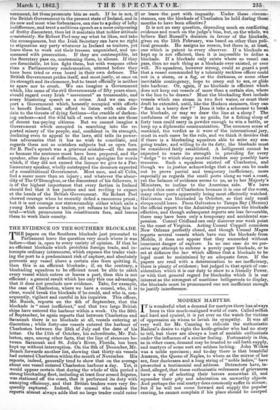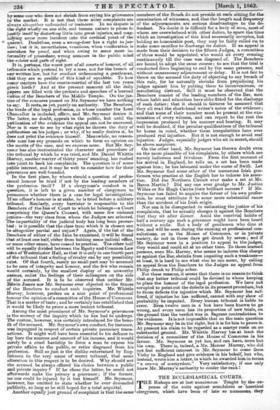MODERN MARTYRS.
I T is wonderful what a demand for martyrs there has talways been in this much-maligned world of ours. Called selfish and hard and cynical, it is yet ever on the watch for victims of oppression on whom to lavish its sympathy. It was all very well for Mr. Canning to ridicule the enthusiastic Radical's desire to right the knife-grinder who had no story to tell, but there are always a host of amiable enthusiasts under the influence of a similar feeling. Fortunately in this, as in other cases, demand may be trusted to call forth supply, and martyrs of some sort are seldom lacking. John Wilkes was a noble specimen ; and to-day there is that beautiful Amazon, the Queen of Naples, to whom as the mirror of her sex, four duchesses and a long string of "noble ladies," have presented a testimonial and address. Detractors have, in- deed, alleged, that these enthusiastic redressers of grievances have a way of selecting their heroes somewhat ill, and squander their pity and admiration on unworthy objects. And perhaps the real martyr does commonly suffer in silence; but if he will not come forward and supply the popular craving, he cannot complain if his place should be usurped quarrel. Doubtless; even a wrong-doer has a right to jus- tiee ; islet it is, nevertheless vexatious, when vociferation is mistaken for proof, and when owing to some mere in- formality of procedure, wrong aseumen in the public mind the. eolour and garb of right. It is, perhaps, the worst part of all carrrts of honour, of all tribunals which pretend to try a man, not for the breach of awy written law, but for conduct unbecoming a gentleman, that they are so prolific of this kind of squabble. To how many martyrs have the- courts-martial of the last ten, years given birth ? And at the present moment all, the daily papers are filled with the protests and speeches of a learned victim of the Benchers of the Middle Temple. On the jus- tice of the censures passed on Mr. Seymour we have nothing to say. It rests, as yet, purely on authority. The Bench era, the heads. of the legal profession, in whose number the Lord Chancellor is included, affirm, and Mr. Seymour denies it. The latter, no, doubt, appeals to the public, but until the pablication of the evidence the appeal can not be answered. Nor is it easy to see by what right he throws the duty of publieation on his judges ; or why, if he really desires it, he does not print the evidence himself. Meanwhile, DA reason- able. man has any grounds. on which to form an opinion on the merits of the case, and we express none. But Mr. Sey- mour has also incriminated the character and. procedure of the tribunal by which he was tried, and Mr. Daniel Whittle Harvey, another martyr of thirty years' standing, has rushed into print to back hits complaints. The question is of some public interest, and it may be well to consider how far their grievances are well founded.
hi the first place, by whom should a question of profes- sional honour be tried if not by the leading members of the profession itself? If a clergyman's conduct is in question, it is left to a given number of clergymen to pronounce whether there is a case for legal investigation. If an officer's honour is at stake, he is tried before a military tribunal. Similarly, every barrister is. responsible to the Benehers of the Inn of Court to which he belongs—a Court comprising the Queen's Counsel, with some few eminent juniors—the very class from whom the Judges are selected. The impartiality of the judicial body has long been prover- bial: is it possible that the clam from which it is chosen can be altogether partial and unjust ? Again' if the het of the Benchers of either of the Inns be examined, it will be found that at least one half, either from holding some judicial office, or some other cause, have ceased to practise. The other half will be equally divided between the Equity and Common Law sides of Westminster Hall, so that it is only in one fourth part of the tribunal that a feeling of rivalry can by any possibility exist. Of that fourth, surely no small part may be assumed to be men of integrity and honour, and the few who remain would certainly, by the smallest display of an unworthy animus, enlist the feelings of their colleagues on the side of the accused. It is to be observed that neither Mr. Edwin James nor Mr. Seymour ever objected to the fitness of the Benchers to conduct such inquiries. Mr. Whittle Harvey, however, prefers on a. nice point of professional honour the opinion of a committee of the House of Commons. That is a matter of taste ; and he certainly has established that it would be likely to prove a more lenient tribunal. Among the most prominent of Mr. Seymour's grievances is the secrecy of the inquiry which be has had to undergo: The custom, however, was certainly introduced for the benes fn of the accused. Mr. Seymour's own conduct, for instance, was impugned in respect of private pecuniary trans- actions. It might well have been. essential to his defence to lay bare the sources and amount of his income, and it would surely be a cruel hardship to force a man to expose his private affairs to the public, or retire disgraced from his profession. Still so just is the dislike entertained by Eng- lishmen to the very name of secret tribunal, that some alteration in this respect is to be desired. Why should. not the accused be always offered his choice between a public and private inquiry ? If he chose the latter, he could not afterwards make the privacy a grievance; if the farmer, no one could be injured by it but himself. Mr. Seymour, however, has omitted to state whether he ever demanded publicity, so lon :us he still hoped for a total acquittal. Another equally just ground of complaint is that the same by some one who does not shrink from crying his grievances in the market. It is not that these noisy complaints are always altogether unfounded or insincere. In no dispute is the right whekly on one side, and human nature is prone to justify itself by distorting little into great injuries, and mag- nifying some mere incident into the cardinal point of the members of the Bench do not preside at each sitting for the examination of witnesses, and that the length and frequency of the adjournments are serious disadvantages to the de- fendant. No floulst it is difficult for a body of men, most of whom are overwhelmed with other duties, to spare the time which an investigation of this kind necessarily occupies, but holding an honourable post, they may be fairly called on to make some sacrifice to discharge its duties. If an appeal is made from their decision to the fifteen Judges, a committee of three would be appointed, who would sit every evening continuously till the case was disposed of. The Bencherst are bound to adopt the same course ; to see that the trial is conducted from beginning to end by the same persons, and without unnecessary adjournment or delay. It is not fair to throw on the accused the duty of objecting to any breach of this rule, for he naturally shrinks from prejudicing his judges against him by putting them to inconvenience, or manifesting distrust. Still it must be observed that the Benchers consist of the leading members of the Bar, men whom habit and education have alike fitted for the discharge of such duties; that it should in fairness be assumed that they all read the short-hand writer's notes of the evidence; and that some of their number must be present at the exa- mination of every witness, and can report to the rest the impression produced by his manner and. bearing. It may well be doubted, if the peculiarqualifications of the tribunal be borne in mind, whether these irregularities have ever produced real injustice. But it is not enough to avoid real injustice. Judges, especially judges who sit in secret, should be above suspicion. On the other hand, Mr. Seymour has thrown, doubt even on the more plausible of his complaints, by others which are merely ludicrous and frivolous. From the first moment of his arrival in England, he tells us, a set has been made against him; he has laboured under the curse of Swift. Let Mr. Seymour find some other of the numerous Irish gen- tlemen who practise at the English bar to indorse his asser- tion. Did the Northern Circuit ever make a set at Mr. Baron Martin? Did any one ever grudge to Mr. Justice Wilke or Sir Hugh Cairns their brilliant success ? If Mr. Seymour has failed to acquire the favour of his own profes- sion, he must attribute it to some more substantial cause .than the accident of his Irish origin. Nor can it be disregarded in estimating the justice of his complaints, that he actually charges it against the Benchers that they sit after dinner. Amid, the convivial habits of half a century ago such a grievance might have been heard without a smile. But a body of gentlemen who dine at five, and will be seen during the evening at professional con- sultations, or in. the House of Commons, or in private society, do not in these days' get drunk by seven ; and if Mr. Seymour were in a position to appeal to the judges, they would and could. sit at no other time. To those learned persons, even Mr. Harvey, who seems to indorse this charge as against the Bar, shrinks from imputing such a weakness— at least, it is hard to see what else he can mean, by calling an appeal from the Benchers to the Judges an appeal from Philip drunk to Philip sober. For these reasons, it seems that there is no reason to think that any better tribunal could be devised in whose keeping to place the honour of the legal profession. We have not scrupled to point out the defects in. its present procedure, but to those defects the injustice which Mr. Seymour has suf- fered, if injustice he has suffered, cannot with any show of probability be imputed. Every human tribunal is liable to error. Even twelve men in a box have been known to go wrong, and every term has its proportion of new trials, on the ground that the verdict was in flagrant contradiction to the evidence. It is not impossible that on the main question Mr. Seymour may be in. the right, but it is for him to prove it. At present his claim to be regarded as a martyr rests on no substantial ground. Mr. -Whittle Harvey has at least the decision of a committee of the House of Commons in his favour. Mr. Seymour as yet has, and. can have, none but his own. There is, indeed, a Mr. Mercer Murray, who did not feel sufficient interest in Mr. Seymour to come from Vichy to England and give evidence in his behalf, but who, instead, wrote him a letter, in which he awarded himin terms "a crown of martyrdom." Very satisfactory, if one only knew Mr. Murray's authority to confer the rank !































 Previous page
Previous page